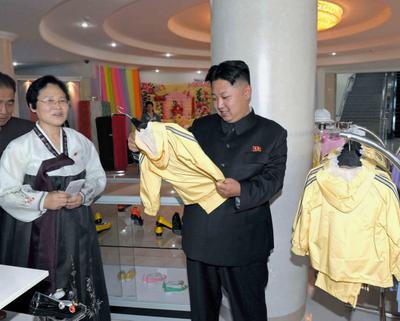Not that anyone is asking the people their view, but even a system as top-down as North Korea cannot wholly neglect the popular mood. So the leaden stress on continuity must also be leavened by hints of change, offering hope for the future.
Faced with these conflicting pulls of continuity and change, Kim Jong-un, or those behind him, made an interesting and clever choice: to hold a massive children’s party. Over 20,000 ‘model members’ of the Korean Children’s Union (KCU), drawn from all over the country, came together in Pyongyang during 3–8 June to mark the organisation’s 66th birthday.
Though every child in North Korea must belong, it has been a long time, if ever, since the KCU found itself so much in the spotlight. Founded in 1946 at the very outset of the regime — two years before the DPRK itself was proclaimed — its anniversary was celebrated with pomp and pageantry. Beginning a fortnight beforehand this occasion filled the media, first with eager anticipation and then with the various events including mass parades, ‘birthday spreads’ provided for a lucky few, trips to amusement parks, and much more.
The climax was a mass rally at which Kim Jong-un gave his second public speech (putting him two ahead already of his late father on that front). The young leader praised the ‘beloved KCU members’ as ‘treasures more precious than a hundred million tons of gold and silver, as they represent hope and future’. But he did not fail to remind them that ‘there were no such great fathers in the world as the Generalissimos who put forward the children as kings of the country and devoted everything to the schoolchildren all their lives … the KCU members should learn from the glorious childhood of Generalissimos Kim Il-sung and Kim Jong-il and reliably carry forward the lifeblood of the revolution holding aloft the flag of KCU after the flag of the immortal sun, always cherishing the trust and benevolence of the Generalissimos’.
One hates to spoil a party, but needless to say the reality for most is very different.
In 2009 a South Korean NGO, Citizens’ Alliance for North Korean Human Rights (NKHR), published a report on the real situation of children in North Korea. It touches on issues including: children being used as forced labour by schools; high education dropout rates and illiteracy rates; barriers to school entrance and choosing one’s own occupation; access to healthcare being hampered by corrupt medical personnel; children being employed for the production of illicit drugs, juvenile justice and the use of torture; and the mobilisation of children for the army. On 13 June Human Rights Watch reported that such practices still continue, citing recent defector interviews.
Another recent report — ‘Marked for Life: Songbun, North Korea’s Social Classification System’ published by the US-based Committee for Human Rights in North Korea (HRNK) — highlights what might be called primordial child abuse. As HRNK explains: ‘The North Korean government assigns a … status to every citizen at birth based on the perceived political loyalty of his or her family going back generations. While a small, politically loyal class in North Korea is entitled to extensive privileges, the vast majority of citizens are relegated to a permanent lower status and then discriminated against for reasons they cannot control or change’.
By definition, songbun brands a child from birth for something he or she did not do. In extremis this creates situations like that of Shin Dong-hyuk, actually born in the gulag where his parents were imprisoned because relatives had fled to South Korea.
Laying on a week of fun for a fortunate few is just a gesture. If Kim Jong-un really wants to improve the lot of North Korea’s children, policies will have to change. That means not just the economy but also social policy. Yet for many it is too late. ‘Marked for life’ applies even more literally to the Kim regime’s most palpable crime against North Korea’s children: the avoidable famine and continuing malnutrition which have left a third of under-5s stunted.
Kim Jong-un, himself hardly underfed, has publicly pledged that North Koreans should no longer have to tighten their belts. The rising generation will be the ones to judge whether he keeps his word.
Aidan Foster-Carter is Honorary Senior Research Fellow in sociology and modern Korea at Leeds University and a freelance consultant, writer and broadcaster on Korean affairs.
A longer version of this article first appeared at, and is used with the kind permission of, NewNations.com.

